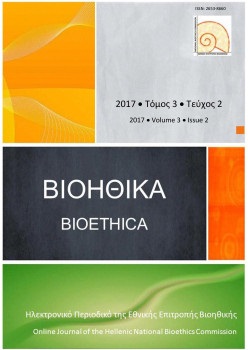Bioethics and the epistemological paradigm of complexity
Abstract
Nearly half a century now, the regulation of biomedical research and its technological applications, particularly in medical practice, takes place through a novel combination of positive sciences with humanities, philosophy and social theory of science. However, their combination is still a challenge both practically and theoretically. The practical challenge is how scientific and technological progress combined to the economic and social development it brings is harmonized with the protection of natural and social goods as well as the respect for individual freedoms. Besides, the regulation of biomedicine consists an epistemological challenge for philosophy and theory of science. The work of the deceased Thanassis Papachristou, Professor of Law School of the National and Kapodistrian University in Athens and a former member of the National Bioethics Committee, has been a pioneer precisely because he perceived the dual challenge being simultaneously a civilist and a sociologist of law.
The article explains first the reasons why his work opens up to a dynamic view of the regulation of biomedicine. Second, it proceeds further and after quoting the basic theoretical assumptions of the epistemological example of complexity, it develops arguments in favor of its adoption for the interpretation and description of bioethics with bio-law and their combination in the modern model of regulation of biomedicine. Thirdly, the article exposes some thoughts about the implementation of the complexity paradigm in the case pf the Greek model of regulation of biomedicine and the dynamics of bioethics development within it.
Article Details
- How to Cite
-
Ρεθυμνιωτάκη (Eleni Rethimiotaki) Ε. (2017). Bioethics and the epistemological paradigm of complexity. Bioethica, 3(2), 17–25. https://doi.org/10.12681/bioeth.19721
- Section
- Original Articles
Authors who publish with this journal agree to the following terms:
- Authors retain copyright and grant the journal right of first publication with the work simultaneously licensed under a Creative Commons Attribution CC BY 4.0 License, which allows for immediate free access to the work and permits any user to read, download, copy, distribute, print, search, or link to the full texts of articles, crawl them for indexing, pass them as data to software, or use them for any other lawful purpose. Appropriate credit must be given by citing the author(s) and the original publication in this journal.
- Authors are able to enter into separate, additional contractual arrangements for the non-exclusive distribution of the journal's published version of the work (e.g. post it to an institutional repository or publish it in a book), with an acknowledgement of its initial publication in this journal.
We encourage authors to deposit their articles, as well as data underlying the publications, in institutional and/or other appropriate subject repositories.
Bioethica permits and encourages authors to archive the final publication pdf in institutional (e.g. the repository of the National Hellenic Research Foundation) or other appropriate subject repositories (e.g. SSOAR repository for social sciences), in compliance with institutional and/or funder open access policies, after publication in the BIOETHICA. Authors must provide bibliographic details that credit publication in the journal, as well as related funding details (when applicable).
Lists of institutional and other subject-based academic open access repositories can be found listed by country at the registry http://opendoar.org/countrylist.php
If your institution does not possess a repository you may deposit a copy of your paper at no cost with www.zenodo.org , the repository supported for open access research in the EU by the European Commission, through the project OpenAIRE (www.openaire.eu )



